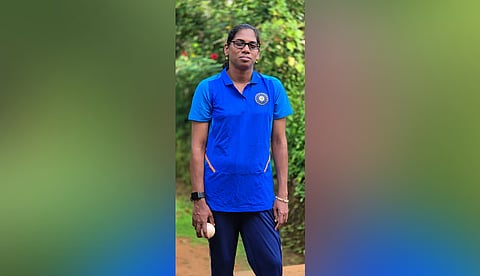

Written by Shyam PV for The New Indian Express
When the national selectors read out her name, even if only as a reserve batter, Jamsheela K felt like she had just middled the sweetest cover drive. Life has bowled plenty of bouncers at the 37-year-old B2-category visually impaired woman. But Jamsheela never ducked. She stood tall at the crease, determined to keep the scoreboard of her dreams moving.
Now, with a place in the Indian squad for the first-ever Women’s T20 World Cup for the Blind, to be hosted by India from November 11 to 25, her innings is no longer a solitary knock. It has become a team anthem for thousands who once thought disability meant retiring from ambition even before stepping onto the pitch.
The early ‘overs’
Born into an orthodox Muslim family, cricket wasn’t even a distant thought in her childhood. “Playing cricket was a daydream for me,” Jamsheela admits.
“I grew up glued to the thrill of the game, never missing an India-Pakistan clash and celebrating every stroke of my all-time hero, Sachin Tendulkar. But the idea of me playing never crossed my mind, until just five years ago. It all began during a trip with one of my blind students to a summer cricket camp. Watching those children lit a spark in me. I reached out to the Cricket Association for Blind Kerala, and they welcomed me with open arms. From that moment, my life turned around. What was once only a distant dream suddenly became a beautiful reality,” she recalls, with a smile as wide as a boundary rope.
A natural opener
Within a year, Jamsheela had earned her place as Kerala’s opening batter. And her numbers since then speak louder than words. In 30 listed matches (as per CABI records), she has piled up 864 runs at a strike rate of 141.18 and an average of 50.82, with a highest score of 86 not out. Just like her hero Sachin, she prefers a heavy willow — her bat weighs 1.36 kg. Why? “The sound of the ball rushing off the bat tells me everything,” she says.
And now, the biggest stage — a world cup — is calling.
“I may be the oldest player in the team, but I’m determined to step onto the field and represent my country with pride,” she says, preparing to attend a training camp beginning on September 30.
Age, she believes, is no disadvantage. If anything, it has taught her patience, perseverance, and perspective — skills just as vital as a quick eye or sharp reflexes.
Playing the tough deliveries
Jamsheela’s journey hasn’t been free of challenges -- financial hurdles, academic struggles, and the suffocating over-care that society often places on differently abled individuals. But she met each ‘ball’ head-on, playing her ‘shots’ with grit and placement. For her, selection to the national squad is more than a statistic.
“The India jersey itself is the cap I never thought I’d wear. Even as a reserve, it is a recognition of years of struggle. You’re in the game, and you matter,” she says.
What drives Jamsheela is not only her love for cricket but her hope that others will follow in her footsteps.
“Many parents over-protect children with disabilities. They don’t let them step out, fearing injury or judgment. But unless you take guard at the crease, you’ll never know the joy of facing your first ball,” she says.
Her message is as direct as a straight drive: “Don’t let others declare your innings before you’ve even batted. Step out, face the first delivery, and make your own runs.”
To those who know her story -- from teaching craft in a small Palakkad school to making the national squad for a world cup -- Jamsheela is proof that cricket’s spirit is not about stadiums or scoreboards. It is about resilience, courage, and the unyielding will to play on, no matter the odds.
